Related Research Articles
Karl Heider is an American visual anthropologist.

Lewat Djam Malam is a 1954 Indonesian film directed by Usmar Ismail and written by Asrul Sani. Widely regarded as a classic of Indonesian cinema, the film follows an ex-soldier in his vigilante actions against corruption.

Pareh, released internationally as Pareh, Song of the Rice, is a 1936 film from the Dutch East Indies. Directed by the Dutchmen Albert Balink and Mannus Franken, it featured an amateur native cast and starred Raden Mochtar and Soekarsih. The story follows the forbidden love between a fisherman and a farmer's daughter.
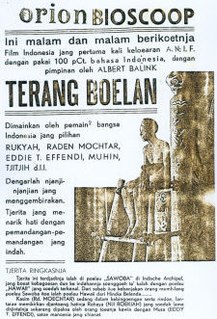
Terang Boelan is a 1937 film from the Dutch East Indies. Written by Saeroen, directed by Albert Balink, and starring Rd Mochtar, Roekiah and Eddie T. Effendi, Terang Boelan follows two lovers who elope after one is almost forced to marry an opium smuggler. The film was shot in the Indies and Singapore, and was partially inspired by the 1936 Hollywood film The Jungle Princess. It was aimed at native audiences and included keroncong music, which was popular at the time, and several actors from Balink's previous work Pareh (1936).

Kris Mataram is a 1940 film from the Dutch East Indies that was directed by Njoo Cheong Seng and starred Fifi Young and Omar Rodriga as two lovers divided by class. Young's feature film debut, the film was the first produced by Oriental Film and depended on Young's stardom as a stage actress to attract viewers. It may be a lost film.
Karnadi Anemer Bangkong is a 1930 comedy from the Dutch East Indies directed by G. Krugers. It is considered the country's first talkie, although parts were silent and the sound quality was poor. Based on a popular Sundanese novel, the film was considered controversial by the native audience.

Roekihati is a 1940 film from the Dutch East Indies. Directed by the brothers Joshua and Othniel Wong and produced by Tan's Film, it follows a young village woman who goes to the city and encounters various difficulties. Targeted at lower-class audiences, it was shot in black-and-white and starred Roekiah and Raden Djoemala.
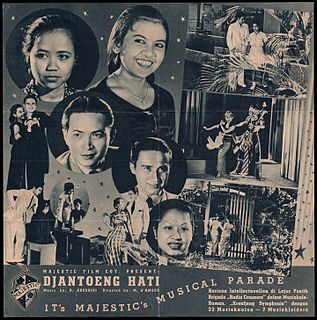
Djantoeng Hati is a 1941 film from the Dutch East Indies directed by Njoo Cheong Seng. A tragedy warning against modernity, it starred A Sarosa, Rr Anggraini, and Ariati
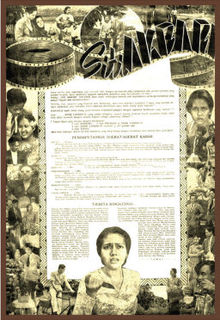
Siti Akbari is a 1940 film from the Dutch East Indies directed by Joshua and Othniel Wong and produced by Tan Khoen Yauw. Starring Roekiah and Rd Mochtar, it follows a couple while the husband commits adultery.
Salah Asuhan is a 1972 film directed by Asrul Sani, produced by Andy Azhar, and starring Dicky Zulkarnaen, Ruth Pelupessy, and Rima Melati. Adapted from Abdoel Moeis' 1928 novel of the same name, it tells of a man who betrays his upbringing for the metropolitan life, while at the same time marrying an Indo woman instead of the one chosen by his mother.
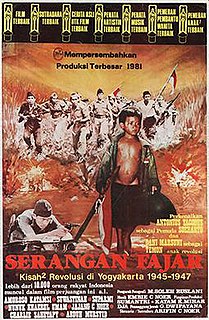
Serangan Fajar is a 1982 Indonesian war film directed by Arifin C. Noer and produced by G. Dwipayana. Telling the lives of several persons during the Indonesian National Revolution, the film used wayang imagery to show heroism. The critically acclaimed film has been read as emphasising then-President Suharto's role in the revolution, especially the General Offensive of 1 March.

Pengantin Pantai Biru is a 1983 film directed by Achmad Salim, produced by Ferry Angriawan, and starring Meriam Bellina and Sandro Tobing. It follows two castaways, children who grow up with one of their fathers but must fend for themselves after they are captured and deified by natives. Adapted from Henry De Vere Stacpoole's novel The Blue Lagoon, via the film of the same name, Pengantin Pantai Biru introduces several differences to the story.
Poetri Rimba is a 1941 film from the Dutch East Indies which was directed by Inoe Perbatasari and produced by The Teng Chun for Jacatra Film. A love story, it tells of a man who rescues a woman from a gang of thieves and escapes through the jungle.
Elang Darat is a 1941 film from the Dutch East Indies which was directed by Inoe Perbatasari and produced by The Teng Chun for Jacatra Film. A detective film, it follows a man who comes to a village to track the villainous bandit known only as "Elang Darat".
Moestika dari Djemar is a 1941 film from the Dutch East Indies. Multiple modern sources also use the incorrect spelling Moestika dari Djenar, but contemporary sources uses an "m".

Roesia si Pengkor, also known as Hadji Saleh, is a 1939 film from the Dutch East Indies which was directed and produced by The Teng Chun for his Java Industrial Films. Starring Da'ing, Bissu, and Hadidjah, this black-and-white film followed a young woman who is saved from deceptive suitors by her beloved and a man known as "Si Pengkor".

Poesaka Terpendam is a 1941 film from the Dutch East Indies produced by Tan's Film and starring Roekiah, Djoemala, and Kartolo.
Gadis jang Terdjoeal is a c. 1937 film from the Dutch East Indies. It was directed by The Teng Chun, his first film to recognise native interests.
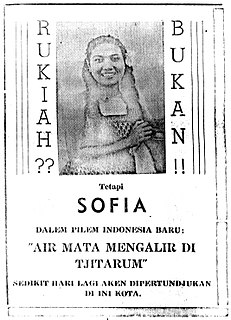
Air Mata Mengalir di Tjitarum is a 1948 film from what is now Indonesia, written and directed by Roestam Sutan Palindih for the Tan & Wong Bros Film Company.

Doea Tanda Mata is a 1985 Indonesian war film directed by Teguh Karya.
References
- ↑ Heider 1991, pp. 99–107.
- ↑ McGregor, Katharine E. (2007). History in Uniform: Military Ideology and the Construction of Indonesia's Past. NUS Press. p. 147. ISBN 978-9971-69-360-2.